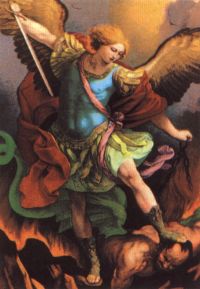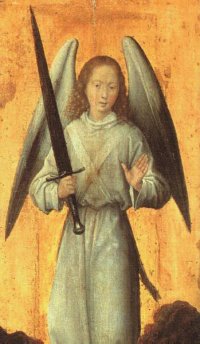
Michael the Archangel
Born: not applicable
Died: not applicable
Canonized: not applicable
Feast Day: September 29
Patron Saint of: airborne, grocers, paratroopers, police officers
Michael in Hebrew means "Who is like God?".
St. Michael is one of the principal angels; his name was the war-cry of the good angels in the battle fought in heaven against the enemy and his followers. Four times his name is recorded in Scripture:
- Daniel 10:13 sqq., Gabriel says to Daniel, when he asks God to permit the Jews to return to Jerusalem: "The Angel [D.V. prince] of the kingdom of the Persians resisted me . . . and, behold Michael, one of the chief princes, came to help me . . . and none is my helper in all these things, but Michael your prince."
- Daniel 12, the Angel speaking of the end of the world and the Antichrist says: "At that time shall Michael rise up, the great prince, who standeth for the children of thy people."
- In the Epistle of St. Jude: "When Michael the Archangel, disputing with the devil, contended about the body of Moses", etc. St. Jude alludes to an ancient Jewish tradition of a dispute between Michael and Satan over the body of Moses, an account of which is also found in the apocryphal book on the assumption of Moses (Origen, De Principiis III.2.2). St. Michael concealed the tomb of Moses; Satan, however, by disclosing it, tried to seduce the Jewish people to the sin of hero-worship. St. Michael also guards the body of Eve, according to the "Revelation of Moses" ("Apocryphal Gospels", etc., ed. A. Walker, Edinburgh, p. 647).
- Apocalypse 12:7, "And there was a great battle in heaven, Michael and his angels fought with the dragon." St. John speaks of the great conflict at the end of time, which reflects also the battle in heaven at the beginning of time. According to the Fathers there is often question of St. Michael in Scripture where his name is not mentioned. They say he was the cherub who stood at the gate of paradise, "to keep the way of the tree of life" (Genesis 3:24), the angel through whom God published the Decalogue to his chosen people, the angel who stood in the way against Balaam (Numbers 22:22 sqq.), the angel who routed the army of Sennacherib (2 Kings 19:35).
Following these Scriptural passages, Christian tradition gives to St. Michael four offices:
- To fight against Satan.
- To rescue the souls of the faithful from the power of the enemy, especially at the hour of death.
- To be the champion of God's people, the Jews in the Old Law, the Christians in the New Testament; therefore he was the patron of the Church, and of the orders of knights during the Middle Ages.
- To call away from earth and bring men's souls to judgment ("signifer S. Michael repraesentet eas in lucam sanctam", Offert. Miss Defunct. Constituit eum principem super animas suscipiendas, Antiph. off. Cf. The Shepherd of Hermas, Book III, Similitude 8, Chapter 3).
Regarding his rank in the celestial hierarchy opinions vary; St. Basil (Hom. de angelis) and other Greek Fathers, also Salmeron, Bellarmine, etc., place St. Michael over all the angels; they say he is called "archangel" because he is the prince of the other angels; others (cf. P. Bonaventura, op. cit.) believe that he is the prince of the seraphim, the first of the nine angelic orders. But, according to St. Thomas (Summa Ia.113.3) he is the prince of the last and lowest choir, the angels. The Roman Liturgy seems to follow the Greek Fathers; it calls him "Princeps militiae coelestis quem honorificant angelorum cives". The hymn of the Mozarabic Breviary places St. Michael even above the Twenty-four Elders. The Greek Liturgy styles him Archistrategos, "highest general" (cf. Menaea, 8 Nov. and 6 Sept.).
In art St. Michael is represented as an angelic warrior, fully armed with helmet, sword, and shield (often the shield bears the Latin inscription: Quis ut Deus), standing over the dragon, whom he sometimes pierces with a lance. He also holds a pair of scales in which he weighs the souls of the departed (cf. Rock, "The Church of Our Fathers", III, 160), or the book of life, to show that he takes part in the judgment. His feast (29 September) in the Middle Ages was celebrated as a holy day of obligation, but along with several other feasts it was gradually abolished since the eighteenth century.
[ Source: The Catholic Encyclopedia ]










